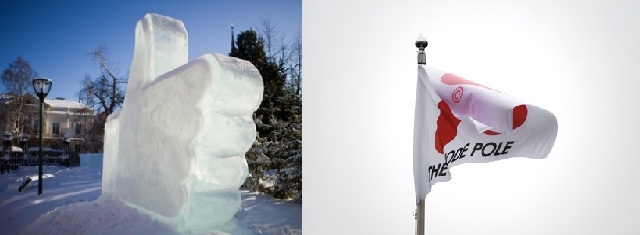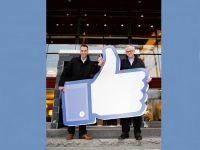Technology
THE NODE POLE THE SITE OF FACEBOOK FIRST DATACENTRE OUTSIDE THE U.S.
HI-TECH HUB IN LULEA, NORTHERN SWEDEN

(Source: Cascade Creative Media - Andreas Nilsson)
USPA NEWS -
The Node Pole is a Hi-Tech hub in Lulea (Northern Sweden) and the site of Facebook's first datacentre outside the United States, the warehouse opened in 2013. Facebooks has four giant datacentres in the United States. The newest being located at Fort Worth in Texas...
The Node Pole is a Hi-Tech hub in Lulea (Northern Sweden) and the site of Facebook's first datacentre outside the United States, the warehouse opened in 2013. Facebooks has four giant datacentres in the United States. The newest being located at Fort Worth in Texas. The construction of the Swedish data is in response to the huge amounts of electronic data being generated around the world, at a rate that doubles roughly every eighteen months.
The Node Pole holds perfect conditions to create bespoke construction solutions for high tech, electricity intensive construction such as data centers. In addition to having an extremely stable electricity infrastructure, The Node Pole region provides natural cooling and renewable hydropower with low energy costs. It is also one of the most geologically, politically and socially stable areas in the world. The Node Pole is owned by the three municipalities, Lulea Business Agency and Norrbotten County Council. (The Node Pole).
The arrival of Facebook has put Lulea on the map. A delegation from the town flew to California in 2009 to meet with Silicon Valley executives. Matz Engman, the CEO of Lulea business and economic development, said that for the next two years, he lived on U.S. West coast time as he lobbied to make The Node Pole a reality. The town beat off competition from a rival in mid-sweden and another in norway. Facebook spent hundreds of millions of dollars on the building. Five other companies have now set up datacentres nearby.
Ruby Bird The Node Pole Facebook Datacentre Sweden Hi-tech Hub Lulea Warehouse United States Fort Worth Texas Data Electronic Construction Solutions Electricity Infrastructure Hydropower Geologically Politically Socially
Liability for this article lies with the author, who also holds the copyright. Editorial content from USPA may be quoted on other websites as long as the quote comprises no more than 5% of the entire text, is marked as such and the source is named (via hyperlink).






